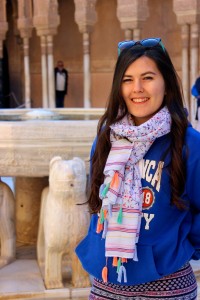OWU Director of Fellowships
E fvnestor@owu.edu


OWU Fellowship Received: Baran Fellowship
With the Baran Fellowship I was able to study abroad in Spain and visit many historical sites and museums related to the Muslim presence in Medieval Spain. These included the Alhambra, the Mosque of Cordoba, the Archeology Museum of Cordoba, the Museo Vivo de Al-Andalus, and the Real Alcazar of Seville. I was also able to explore the cities of Toledo, Cordoba, Seville, and Granada (all important cities for the history of Muslim Spain). Initially I wanted to examine the period of religious “convivencia” (peaceful religious cohabitation of Muslims, Christians, and Jews under Muslim rule) that I had heard about in my History and Spanish courses. However, after outlining the topic, I was informed by some professors that there was contention among scholars as to how peaceful this religious cohabitation was. I found that even though there was a lot of advertisement about “convivencia” in Spanish museums and tourist sites, the subject was not discussed in detail. Many of the authors I read who argued strongly for the existence of “convivencia” seemed to have social agendas that had less to do with the past and a lot to do with trying to diffuse present religious tensions. This sparked my interest in the impact of historical narratives (and narratives in general) on society, and how people tend to look to the past to validate their ideas about the present. To further investigate this topic I am taking a directed reading with Dr. Gingerich on how the narrative of Muslims in Spain has shifted throughout history to support the social climate and political agendas of the day.
The Baran Fellowship was what enabled me to put my ideas about Muslim Spain into a physical context, which in turn helped me see just how much my own ideas about the topic had been shaped, not by the material evidence from that period, by a desire for a narrative about the past that would give me more context for the present (in this case, the possibility of peaceful religious cohabitation). The whole experience has helped define for me some of the fundamental reasons why people study history in the first place. I am excited to continue to explore the concepts and implications of narrative in the future!